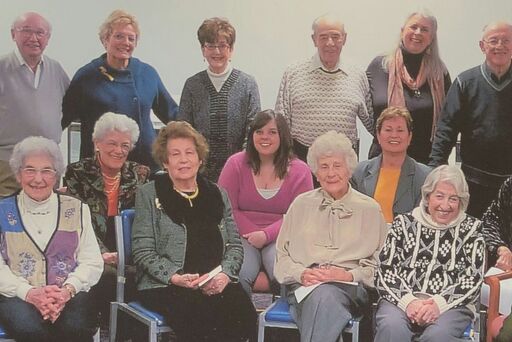History of the Gratz Holocaust Oral History Archive

The Holocaust Oral History Archive (HOHA) of Gratz College, established in 1979, is one of the earliest collections of primary Holocaust testimony in the United States. Professors Nora Levin and Josey Fisher, impacted by video testimony of survivors in Yale University’s Department of Psychiatry, committed themselves to documenting unique accounts of Holocaust experience in the Philadelphia area. At the time, individual narratives were not yet recognized by established historians as integral to Holocaust documentation. With no funding and no established model, the Holocaust Oral History Archive project began.
Concerns over rising Holocaust denial prompted many previously reticent survivors to go on record, and Gratz College was a familiar and trusted community resource. Trained volunteers visited their homes, tape recorders in hand. Supportive interviewers at familiar kitchen tables encouraged survivors to share painful, complex memories. For some of them it was the only time they would do this; for others, it encouraged them to continue to speak. They began to find their narrative, a way to tell their stories. For scholars and educators, these testimonies became an essential part of Holocaust documentation, personalizing and humanizing the experience so that the historical context breathes with reality.
The Holocaust Oral History Archive volunteers included survivors who interviewed, aided with translations and place names, and enriched our collection with their personal accounts—a Polish teen hiding in Warsaw, a young German woman passing as a non-Jew, a young French-Russian teen liberated from Auschwitz, a Czech teen rescued in Denmark and Sweden, several young evacuees on the Kindertransport, two children on the SS St. Louis, and a teen on the HMT Dunera.
The outreach expanded in 1985 when the American Gathering of Holocaust Survivors was held at the Civic Center in Philadelphia. The Archive recruited hundreds of additional volunteers and held a day-long training session in the sanctuary of Rodeph Shalom Synagogue in Center City. Organizers used curtains to provide private interview space within the main hall, and copies of these audiotapes were later sent to the interviewees. It became clear that some had not yet shared the details of their experience with their families and these tapes provided a transition to more open communication.
Two additional gatherings in 1991 and 1998, dubbed “Rickshaw Reunions”, were held in local Philadelphia hotels. These reunions were for those who found safety in Shanghai beginning in the 1930’s as discrimination against Jews intensified in Europe. Japan invaded China during the War, and the 20,000 Jews of Shanghai were forced into tight and unsanitary conditions but were spared the genocide of their family members who stayed in Europe. The “Shanghailanders” were happy to take time away from their reunions to interview with the volunteers from the Oral History Archive.
Included in the Archive are the digitized sound recordings of the collection made possible through partnerships with the U.S. Holocaust Memorial Museum in Washington, D.C. and Yad Vashem in Jerusalem. Transcriptions of a sizeable number of interviews have been meticulously audited by dedicated Archive volunteers. Summaries and search terms provide additional access to the collection.